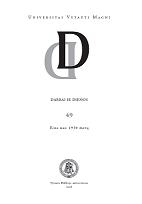ŽANRŲ KAITA POSOVIETINĖS LIETUVOS DIENRAŠČIUOSE
GENERIC SHIFT IN POST-SOVIET LITHUANIAN DAILIES
Author(s): Rūta MarcinkevičienėSubject(s): Language and Literature Studies
Published by: Vytauto Didžiojo Universitetas
Keywords: laikraštis; Kauno diena; dienraštis; interviu; ideologija; newspaper; „Kauno Diena“; daily; interview; ideology.
Summary/Abstract: The paper takes a generic approach towards the analysis and comparison of „Kauno Tiesa,“ a daily newspaper during the Soviet period, and its counterpart „Kauno diena“ in post-Soviet Lithuania. The specific generic analysis is performed on three issues ranging from the years 1964, 1986 and up to 2008. All of them appeared at the beginning of May and were dedicated to the Day of Press. The choice of these specific issues allows the author to find a common denominator for the comparison of otherwise hardly comparable issues. The aim of the comparison is to reveal the most general tendencies in the development of post-Soviet Lithuanian dailies. However, the development is caused by a few important factors such as an overall change of times; overwhelming technological shifts due to the application of computers; and a change in the country’s status, i.e. the shift from a totalitarian system towards democracy. The latter ideological change was conceived as crucial for the dramatic change in the form, contents, and function of the dailies under investigation. The generic approach was chosen as the main aspect of research because of its underlying theoretical assumptions. Genre is assumed here as a social action, the basic substance of any culture, therefore it is taken as a conditio sine qua non for any text. Te purity of a genre, the clarity of its status may be questioned but not its existence in general. The present paper presents some methodological insight into the nature of a genre as well as into the problems of its identification in general. Moreover, it compares classifications of genres of periodical literature that prevailed in Western countries and Eastern or Central Europe since generic shift was mainly a matter of the westernization of the daily press. The outcome of generic shift was threefold. It comprised the (dis)appearance of specific genres and radical changes in the existing genres. All ideologically biased materials such as the speeches of CPSU leaders and reports on CPSU congresses were gone as soon as Lithuania regained its independence in 1990. Gradually, after the privatization of the press their place was taken by new macro genres such as advertising and comments. Other genres, especially service information and news items, underwent considerable changes also. The paper concentrates on the most obvious of them, as reflected in the informational structure, style, and language of the texts. The overall tendencies observed in the development of post-Soviet dailies are quite paradoxical. Although a much bigger variety of genres appeared in the last two decades, a clear-cut tendency of less diversity of their textual structure is obvious. The ideology of texts changed from an assumed objective to an imposed subjective approach towards reality. The most striking difference, however, is the shift in the pathos of dailies from false but positive towards true but negative.
Journal: Darbai ir dienos
- Issue Year: 2008
- Issue No: 49
- Page Range: 197-217
- Page Count: 21
- Language: Lithuanian

